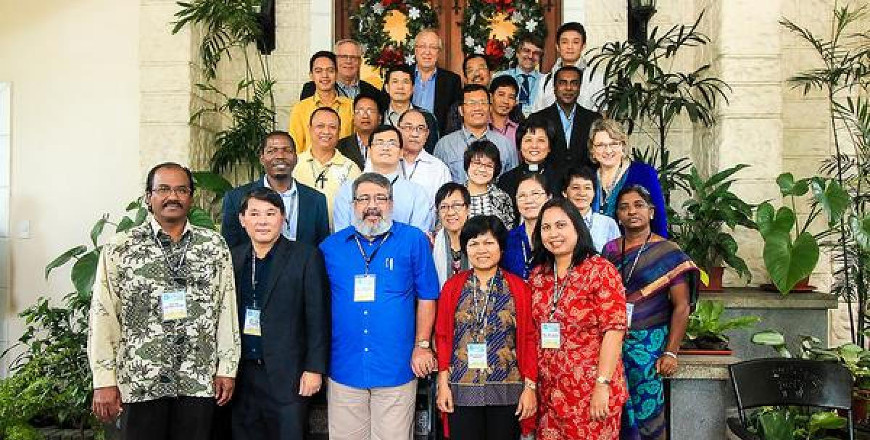“How good and pleasant it is when God’s people live together in unity! … For there the Lord bestows his blessing, life forevermore.” Psalm 133 The fourth conference on Lutheran Identity and Self-Understanding for the LWF’s Asia-Pacific region was held in Manila from 16-20 November, coinciding with the APEC conference in the same city. Despite […]
“How good and pleasant it is when God’s people live together in unity! … For there the Lord bestows his blessing, life forevermore.” Psalm 133
The fourth conference on Lutheran Identity and Self-Understanding for the LWF’s Asia-Pacific region was held in Manila from 16-20 November, coinciding with the APEC conference in the same city. Despite the traffic jams and sense of security lock-down in Manila during that week, the 28 LWF delegates plus local visitors found a warm and vibrant fellowship as we met around this theme.
This was my first formal encounter with the LWF Asia-Pacific community and I experienced a real sense of the communion that the LWF espouses. As we met around the Word of God in morning worship, and particularly as we shared our local experiences in small group discussion times, the awareness of our unity both in the body of Christ, and in the Lutheran global community was increasingly evident during the week. Delegates came from Japan, India, Singapore and Malaysia, Cambodia and Myanmar, Indonesia and of course our host country the Philippines, as well as LWF international representatives from Africa and Germany. Dr Stephen Haar and I were the two LCA delegates from Australia and New Zealand.
Papers presented focused on aspects of Lutheran self-understanding in different contexts and how this is related to our core Lutheran identity, which is based on external markers such as the Lutheran confessions and the figure of Martin Luther. How are our various self-understandings expressed in our different contexts? What holds us together in unity with these different self-understandings? Highlight papers for me included Dr Arata Miyamoto’s paper that brought together the theology of the cross with the Japanese cultural understanding of cosmic suffering (“dukkha”) as part of the human condition. In a carefully-nuanced discussion he used this core Lutheran theology as a bridge into his culture, letting it speak powerfully to real social catastrophes such as the 2014 tsunami and nuclear power station devastation, and an on-going disease caused by long-term pollution in another area.
Rev Dr Stephen Haar’s excellent discussion on post-modernism and how we might “befriend” this cultural shift, rather than demonise it, also opened up considerable discussion. My sense is that the South East Asian churches have until recently been less affected by post-modernism, but are finding that it is also influencing their own societies now. The challenge that it brings to established authority and to the concepts of absolute truth are still being worked through in many of our sister churches in South East Asia.
The most affecting papers where those that spoke of the real difficulties of being minority religions and minority denomination churches in their home countries. The Lutheran church in the Philippines, seeking to bring the gospel to a hegemonic Roman Catholic population where laws are mediated through a cultural RC bias, faces huge challenges. Entrenched poverty and a fatalistic acceptance of suffering offer opportunities to speak the gospel, despite structural opposition. Likewise the very real persecution of Christians, mostly Lutheran, in Indonesia, with church burnings and refugees fleeing oppressive areas, is very sobering. I have come home from Manilla with a new and prayerful awareness of the challenges facing my Lutheran sisters and brothers in their home countries.
Several papers also invited the self-understanding of women in their respective churches and countries, and whilst this felt somewhat tokenistic at first, I applaud the LWF for seeking to bring women’s experiences from the hidden margins into the light, into the public space. Likewise, a Philippine youth leader gave a dynamic and hope-filled presentation from his perspective on the self-understanding of Lutheran youth in the Philippines.
A final word of thanks must be made to the wonderful people of the Philippine Lutheran church, who provided us with overwhelming hospitality and warm welcomes, and who cared for our every need. Their expression of faith is clear and powerful, and inspiring. My thanks too, to the LCA for inviting me to attend this conference, to make new friends in Christ’s Body, and to have my regional perspective broadened and deepened. It has been a blessed experience.
If you would like to consider the opportunity to serve as a volunteer in mission, serving in practical ways, teaching English, teaching in the seminaries and institutions of our partner churches, or in local churches, you are invited to phone Nevin on (08) 8267 7300 or email nevin.nitschke@lca.org.au. For more information, go to https://www.lcamission.org.au/join-gods-mission/volunteer/
Read more stories about volunteering at https://www.lcamission.org.au/category/join-gods-mission/volunteers/


0 Comment